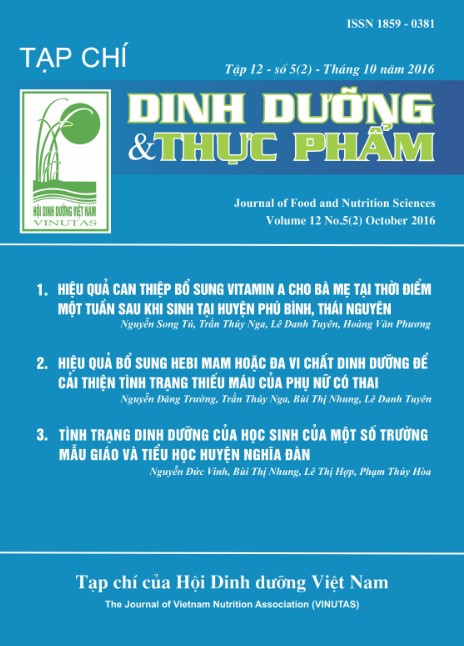EFFECTS OF NUTRITIONAL PRODUCT CONTAINING PROBIOTIC AND PREBIOTIC ON IMMUNE CAPACITY, DIARRHEA, AND RESPIRATORY INFECTION OF CHILD 25-36 MONTHS
Main Article Content
Abstract
Objective: To evaluate the effects of milk formula enriched probiotic and prebiotic
(Synbiotic) on immune capacity, diarrhea and respiratory infection disease of children
from 25 to 36 months old. Methods: A randomized, double blind, controlled trial; children
were randomized to receive an milk formula with (Synbiotic) or without Synbiotic (Control) for 5 months (400ml/day x 5 days/week). Serum IgA and fecal IgA were analyzed at
the beginning, 2.5 and 5month of the study. The number of episode and days of infection
diseases were daily collected. Result: After 5 months, the IgA levels in serum and fecal
were increased significantly in Synbiotic group (+3.64mg/ml & +48mg/g fecal; p<0,01)
higher than that of Control group. The number of episode and days of diarrhea disease;
and the number of days of respiratory infection were significantly reduced; the risk of respiratory infection were also reduced to 34% and 86% for high (OR=0,66) and low
(OR=0,14) respiratory infection in synbiotic compared with control group.
Keywords
Probiotic, prebiotic, Nutritional status, probiotic
Article Details
References
2. Viện Dinh dưỡng (2016). Số liệu thống kê về tình trạng dinh dưỡng trẻ em qua các năm (1999-2015). http://www.viendinhduong.vn/news/vi/106/61/0/a/solieuthong-ke-ve-tinh-trang-dinh-duong-tre-em-qua-cac-nam.aspx.
3. Nguyễn Lân (2012). Ảnh hưởng sữa bổ sung pre-probitotic lên tình trạng dinh dưỡng, nhiễm khuẩn và hệ vi khuẩn chí đường ruột của trẻ 6-12 tháng tuổi tại huyện Phổ Yên, tỉnh Thái Nguyên. Luận án Tiến sỹ Dinh dưỡng, viện Dinh dưỡng quốc gia.
4. Chouraqui JP, Grathwohl D, Labaune JM, et al. (2008). Assessement of the safety, tolerance, and protective effect against diarrhea of infant formulas containing mixture of probiotics or prebiotics in a randomized controlled trial. Am J Clin Nutr 87(5): 1365-1373.
5. Collin MD, Gibson GR (1999). Probiotics, prebiotics, and synbiotics: approaches for modulating the microbial ecology of the gut. Am J Clin Nutr 69 (suppl): 1052S–1057S.
6. Guarner F (2005). Inulin and oligofructose: impact on intestinal disease and disorders. Br J Nutr 93(Suppl 1): 61-65.
7. Kobayashi K, Fujiyyama Y, Hagiwara K, Kondoh H (1987). Resistance of normal serum IgA and secretory IgA to bacterial IgA protease: evidence for presence of enzyme-neutralizing antibodies in both serum IgG. Microbiol Immunol 31: 1097-1106.
8. Sazawal S et al (2006). Efficacy of probiotics in prevention of acute diarrhea: a meta-analysis of masked, randomized, placebo-controlled trials. Lancet Infect Dis: 374-382.
9. Scholtens PAM, Alliet P, Raes M, et al. (2008). Fecal Secretory Immunoglobulin A Is Increased in Healthy Infants Who Receive a Formula with Short-Chain Galacto-Oligosaccharides and LongChain Fructo-Oligosaccharides. J Nutr 138(6): 1141-7
10.Schrezenmeir J, Deverese M (2001). Probiotics, prebiotics, and synbiotics – approaching a definition. Am J Clin Nutr 73:361-364.


